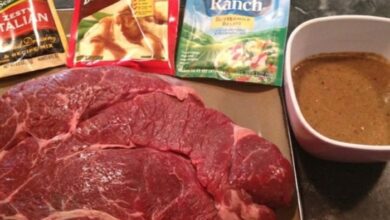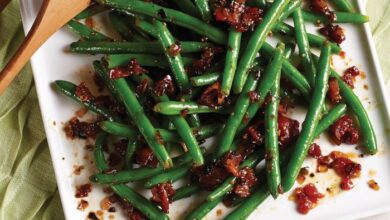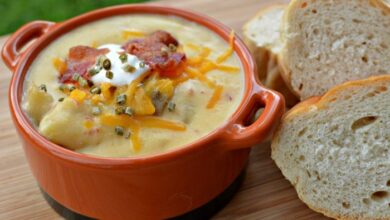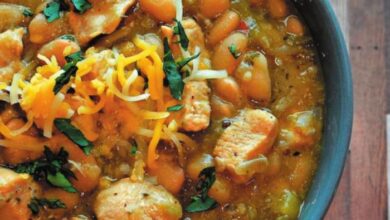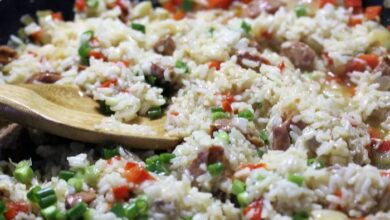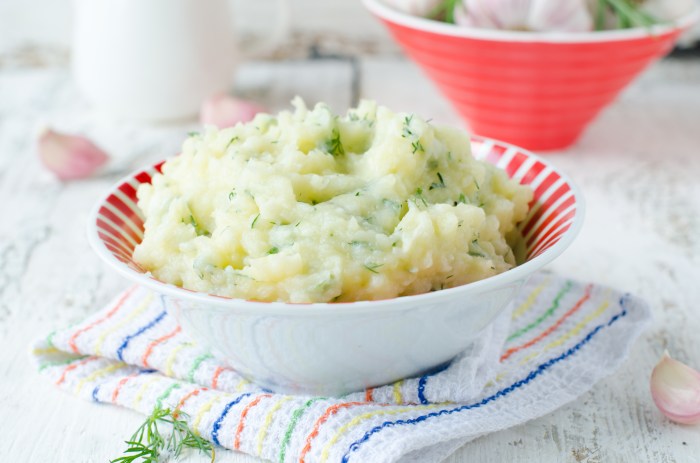
Sour Cream Mashed Potatoes: A Classic Comfort Food
Sour cream mashed potatoes, a culinary staple loved for its creamy texture and comforting flavor, is a dish that has graced tables around the world for generations. The origin of this beloved side dish is debated, with some attributing its roots to European peasant cooking, while others claim it emerged from American kitchens.
Regardless of its origins, sour cream mashed potatoes have evolved into a versatile and adaptable dish, featuring in countless culinary traditions and variations.
The classic recipe typically calls for potatoes, butter, sour cream, milk, salt, and pepper. Each ingredient plays a crucial role in achieving the perfect balance of flavors and textures. The potatoes provide the base, while the butter and sour cream contribute richness and creaminess.
Milk helps to create a smooth consistency, and salt and pepper enhance the overall flavor profile. However, the beauty of sour cream mashed potatoes lies in its adaptability, allowing for countless variations and regional differences.
What is Sour Cream Mashed Potatoes?
Sour cream mashed potatoes are a beloved side dish known for its creamy texture and rich flavor. While the exact origins are unclear, this dish has become a staple in many cuisines around the world, particularly in North America and Europe.
The History and Origins of Sour Cream Mashed Potatoes
Sour cream mashed potatoes are a relatively modern dish, likely emerging in the late 19th or early 20th century. The use of sour cream as a key ingredient gained popularity alongside the rise of dairy farming and refrigeration, making it more accessible to home cooks.
The popularity of sour cream mashed potatoes also coincides with the growing interest in creamy and flavorful side dishes to accompany hearty meals. The combination of mashed potatoes with sour cream offered a delicious and comforting alternative to traditional butter-based mashed potatoes.
Traditional Ingredients and Their Roles, Sour cream mashed potatoes
The traditional ingredients in sour cream mashed potatoes are:
- Potatoes:The foundation of the dish, potatoes provide the creamy texture and starchy base. Russet potatoes are often preferred for their fluffy texture, while Yukon Gold potatoes offer a slightly sweeter and creamier result.
- Sour Cream:Sour cream adds tanginess and richness, balancing the starchy potatoes and creating a smooth, creamy consistency. It also contributes to the dish’s overall moisture and prevents it from becoming dry.
- Butter:Butter adds richness and flavor, complementing the sour cream and potatoes. It also helps to create a smooth and velvety texture.
- Milk or Cream:Milk or cream is used to adjust the consistency of the mashed potatoes, ensuring a smooth and creamy texture. It also adds moisture and helps to prevent the potatoes from becoming too thick.
- Salt and Pepper:Salt and pepper are essential seasonings that enhance the flavor of the dish.
Variations and Regional Differences
Sour cream mashed potatoes have evolved over time, with various regional variations and adaptations. Some common variations include:
- Garlic:Adding minced garlic to the mashed potatoes provides a savory and aromatic flavor.
- Chives or Green Onions:Chopped chives or green onions add a fresh and herbaceous flavor, complementing the creamy texture.
- Cheese:Some recipes incorporate shredded cheddar cheese or other types of cheese for added richness and flavor.
- Bacon:Crispy bacon bits are a popular addition, providing a smoky and savory flavor.
- Herbs:Fresh herbs such as parsley, dill, or thyme can be added for an aromatic and flavorful touch.
Nutritional Value and Health Benefits
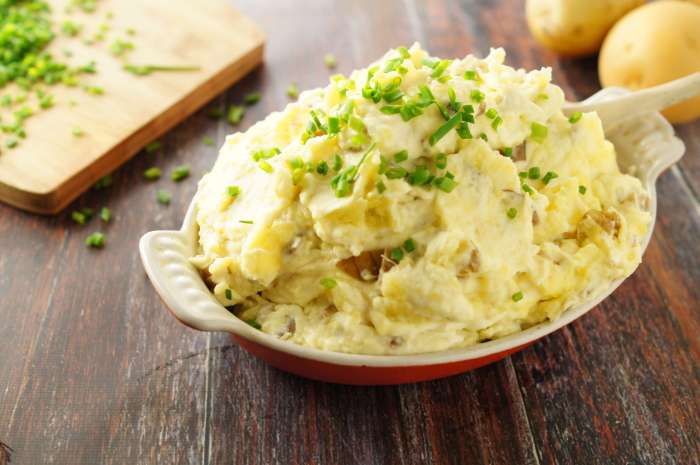
Sour cream mashed potatoes are a popular side dish that is often served with meat and vegetables. While they are delicious, they are also relatively high in calories, fat, and sodium. However, they can also be a good source of some essential nutrients.
Nutritional Breakdown
A typical serving of sour cream mashed potatoes (about 1 cup) contains approximately:
- Calories: 250-300
- Fat: 15-20 grams
- Sodium: 500-600 milligrams
- Carbohydrates: 35-40 grams
- Protein: 3-4 grams
The exact nutritional content will vary depending on the recipe and the ingredients used. For example, using low-fat sour cream or skim milk will reduce the fat and calorie content.
Health Benefits
Although sour cream mashed potatoes are high in calories and fat, they can still provide some health benefits. Potatoes are a good source of vitamin C, potassium, and fiber. They also contain antioxidants that may help protect against chronic diseases.
- Vitamin C: Vitamin C is an important antioxidant that helps protect cells from damage. It is also essential for the production of collagen, which is a protein that helps keep skin, bones, and tendons healthy.
- Potassium: Potassium is an important mineral that helps regulate blood pressure and muscle function. It is also essential for maintaining fluid balance in the body.
- Fiber: Fiber is an important nutrient that helps regulate digestion and promotes feelings of fullness. It may also help lower cholesterol levels and reduce the risk of heart disease.
Drawbacks
The main drawback of sour cream mashed potatoes is their high calorie and fat content. They are also relatively high in sodium, which can be a concern for people with high blood pressure.
Comparison with Other Potato Dishes
Sour cream mashed potatoes are typically higher in calories and fat than other potato dishes, such as baked potatoes or mashed potatoes made with milk or butter. However, they are also a good source of some essential nutrients.
For example, a baked potato with skin contains about 160 calories and 4 grams of fat, while a serving of mashed potatoes made with milk and butter contains about 200 calories and 10 grams of fat.
The best choice for you will depend on your individual dietary needs and preferences. If you are watching your calorie intake, you may want to choose a lower-fat option, such as baked potatoes or mashed potatoes made with skim milk.
Cooking Techniques and Methods
The art of making perfect mashed potatoes lies in achieving a smooth, creamy texture and a delicate flavor. Sour cream adds a tangy richness that elevates this classic comfort food. Here’s a breakdown of the steps involved in preparing classic sour cream mashed potatoes, exploring different cooking methods, and offering tips for achieving optimal results.
Stovetop Method
The stovetop method offers a straightforward and hands-on approach to making mashed potatoes.
- Boiling the Potatoes:Start by peeling and chopping potatoes into roughly equal-sized pieces. This ensures even cooking. Place the potatoes in a large pot, cover them with cold water, and add a generous pinch of salt. Bring the water to a boil, then reduce heat and simmer until the potatoes are fork-tender.
This typically takes about 15-20 minutes, depending on the size of the potatoes.
- Draining and Mashing:Once the potatoes are cooked, drain them thoroughly. While they are still hot, transfer them to a large bowl. Use a potato masher or a hand mixer to mash the potatoes until they are smooth and creamy.
- Incorporating Sour Cream and Seasonings:Add the sour cream, butter, and salt to the mashed potatoes. Adjust the amount of sour cream based on your desired level of tanginess. You can also incorporate other seasonings like black pepper, garlic powder, or chives for additional flavor.
Use a whisk or a hand mixer to blend everything together until the mixture is smooth and creamy.
- Serving:Serve the mashed potatoes immediately. You can also keep them warm in a slow cooker or a covered pot on low heat for a short period.
Oven Method
The oven method offers a more hands-off approach to preparing mashed potatoes.
- Preparing the Potatoes:Preheat your oven to 400°F (200°C). Peel and chop potatoes into roughly equal-sized pieces. Place the potatoes in a large baking dish, drizzle with olive oil, and season with salt and pepper.
- Roasting the Potatoes:Roast the potatoes in the preheated oven for 30-40 minutes, or until they are fork-tender. The potatoes should be slightly browned on the edges.
- Mashing and Seasoning:Once the potatoes are roasted, transfer them to a large bowl. Use a potato masher or a hand mixer to mash the potatoes until they are smooth and creamy. Add the sour cream, butter, and seasonings to the mashed potatoes, and blend everything together until smooth.
- Serving:Serve the mashed potatoes immediately.
Tips and Tricks
- Choose the Right Potatoes:For the best results, use starchy potatoes like russet or Idaho potatoes. These potatoes have a high starch content, which gives mashed potatoes their creamy texture.
- Don’t Overcook the Potatoes:Overcooked potatoes can become mushy and lose their flavor. Cook the potatoes until they are fork-tender, but not mushy.
- Use Cold Milk or Cream:Adding cold milk or cream to mashed potatoes helps to prevent them from becoming too thick.
- Seasoning:Season the mashed potatoes with salt and pepper to taste. You can also add other seasonings like garlic powder, onion powder, or chives.
- Add a Touch of Flavor:For an extra layer of flavor, add a tablespoon of Dijon mustard or a sprinkle of fresh herbs to the mashed potatoes.
- Keep Warm:If you are making mashed potatoes ahead of time, keep them warm in a slow cooker or a covered pot on low heat.
Flavor Variations and Enhancements
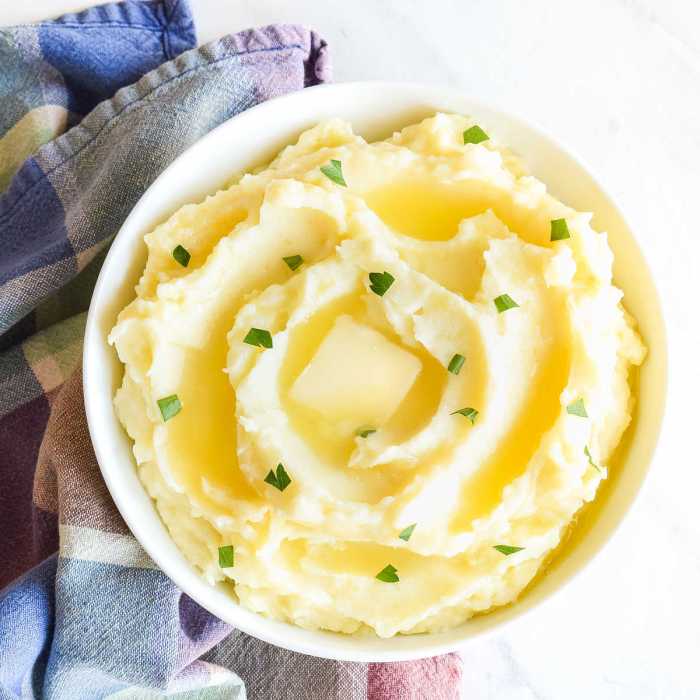
Sour cream mashed potatoes, a comforting classic, can be elevated to new heights with the addition of various flavors and ingredients. These additions not only enhance the taste but also add a touch of personality and complexity to the dish.
Herbs and Spices
Herbs and spices play a crucial role in creating a wide range of flavor profiles. They can add warmth, brightness, and a touch of sophistication to the mashed potatoes.
“A pinch of spice can make all the difference.”
Here are some examples:
- Fresh herbs:Chives, parsley, dill, and rosemary add freshness and a touch of brightness.
- Dried herbs:Thyme, oregano, and basil provide a more concentrated flavor.
- Spices:Garlic powder, onion powder, paprika, and cayenne pepper add warmth and depth.
Cheeses
Cheeses, with their diverse flavors and textures, can transform mashed potatoes into a decadent and indulgent side dish.
- Sharp cheddar:Adds a sharp, tangy flavor.
- Creamy brie:Provides a rich and buttery flavor.
- Parmesan:Adds a nutty and salty flavor.
Other Additions
Beyond herbs, spices, and cheeses, other ingredients can enhance the flavor and texture of mashed potatoes.
- Bacon:Adds a smoky and salty flavor.
- Roasted garlic:Creates a sweet and savory flavor.
- Caramelized onions:Add a sweet and savory flavor.
- Mushrooms:Add a savory and earthy flavor.
Flavor Profiles and Ingredients
| Flavor Profile | Ingredients |
|---|---|
| Classic | Sour cream, butter, salt, pepper |
| Herby | Sour cream, butter, chives, parsley, salt, pepper |
| Spicy | Sour cream, butter, garlic powder, paprika, cayenne pepper, salt, pepper |
| Cheesy | Sour cream, butter, cheddar cheese, salt, pepper |
| Bacon and Cheddar | Sour cream, butter, bacon, cheddar cheese, salt, pepper |
| Garlic and Herb | Sour cream, butter, roasted garlic, thyme, rosemary, salt, pepper |
Serving Suggestions and Pairings
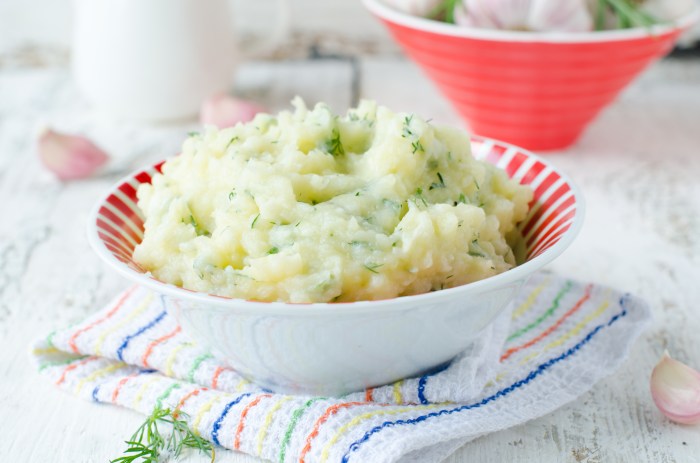
Sour cream mashed potatoes are a versatile side dish that can be paired with a wide variety of main courses. Their creamy texture and rich flavor complement both hearty and lighter dishes, making them a popular choice for various meals.
Pairing with Main Courses
Sour cream mashed potatoes are a perfect accompaniment to a variety of main courses, from classic roasts to lighter seafood dishes. The creamy texture and rich flavor of the potatoes provide a satisfying contrast to the main course, while also enhancing the overall dining experience.Here are some examples of main courses that pair well with sour cream mashed potatoes:
- Roasted Meats:Roast beef, roast chicken, roast lamb, and pork loin are all excellent choices. The richness of the meat pairs well with the creamy texture of the mashed potatoes.
- Grilled Meats:Grilled steak, grilled salmon, and grilled chicken are also great options. The smoky flavor of the grilled meats complements the creamy potatoes.
- Seafood:Baked cod, pan-seared scallops, and broiled halibut are all good choices. The delicate flavor of the seafood is enhanced by the creamy mashed potatoes.
- Vegetarian Dishes:Vegetarian chili, lentil soup, and roasted vegetables are all excellent options. The creamy potatoes provide a comforting element to these dishes.
Serving Options and Accompaniments
The versatility of sour cream mashed potatoes extends beyond the main course pairing. They can be served in various ways to create a complete and satisfying meal.Here is a table showcasing different serving options and their accompanying dishes:
| Serving Option | Accompanying Dishes |
|---|---|
| Classic Side Dish | Roasted meats, grilled meats, seafood, vegetarian dishes |
| Baked Potato Bar | Various toppings such as chili, cheese, bacon, sour cream, chives |
| Shepherd’s Pie | Ground beef, vegetables, gravy |
| Potato Gratin | Roasted vegetables, cheese, herbs |
Accompaniments
To complete the meal, consider adding appropriate accompaniments to your sour cream mashed potatoes.
- Salads:A fresh green salad with a light vinaigrette dressing provides a refreshing contrast to the creamy potatoes.
- Vegetables:Roasted vegetables, steamed vegetables, or a simple side salad can add color and nutritional value to the meal.
- Sauces:A drizzle of gravy, a dollop of sour cream, or a sprinkle of chives can enhance the flavor of the mashed potatoes.
Storage and Reheating
Sour cream mashed potatoes, with their creamy texture and rich flavor, are a delightful side dish that can be enjoyed hot or cold. But what about leftovers? How can you store and reheat them without compromising their deliciousness? Here’s a guide to ensure your mashed potatoes stay fresh and flavorful.
Storage
Proper storage is crucial to maintain the quality of your leftover mashed potatoes. Here are some tips to keep them fresh:
- Refrigerate promptly:Once cooled to room temperature, transfer your mashed potatoes to an airtight container. This prevents them from drying out and absorbing unwanted flavors from the refrigerator.
- Maximize shelf life:Refrigerated mashed potatoes can generally be stored for 3-4 days. However, for optimal taste and texture, it’s best to consume them within 2 days.
Reheating Techniques
While reheating mashed potatoes is a simple process, it’s essential to use methods that preserve their creamy texture and flavor. Here are some effective techniques:
- Stovetop method:This method involves gently reheating the mashed potatoes in a saucepan over low heat. Add a splash of milk or cream to maintain their moisture and prevent sticking. Stir frequently to ensure even heating.
- Microwave method:For quicker reheating, use a microwave-safe dish. Cover the mashed potatoes with a damp paper towel to prevent drying out. Microwave in 30-second intervals, stirring between each, until heated through.
- Oven method:This method is ideal for larger quantities of mashed potatoes. Preheat your oven to 350°F (175°C). Transfer the mashed potatoes to an oven-safe dish, cover with foil, and bake for 15-20 minutes until heated through.
Impact of Reheating on Nutritional Content
While reheating doesn’t significantly alter the nutritional content of mashed potatoes, there are some points to consider:
- Vitamin loss:Some vitamins, particularly water-soluble ones like vitamin C, may be lost during reheating, especially if exposed to high temperatures for prolonged periods.
- Nutrient retention:The overall nutritional value of reheated mashed potatoes remains largely intact, with essential nutrients like carbohydrates, protein, and potassium retained.

